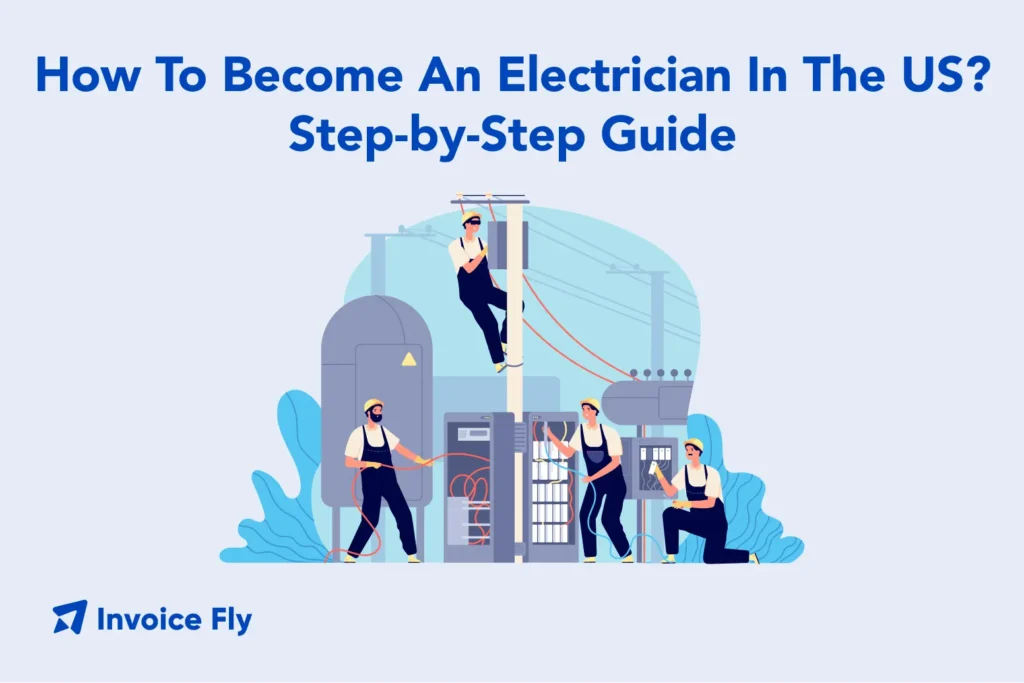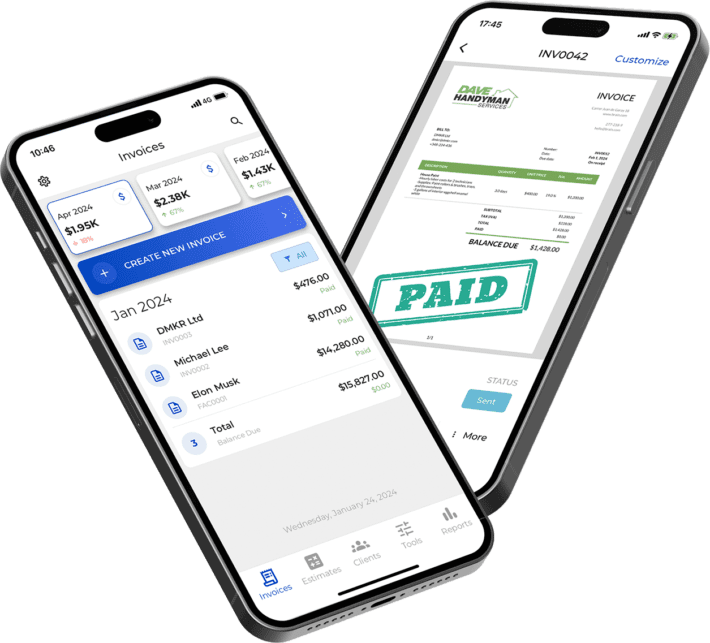How To Become an Electrician in the US? Step-by-Step Guide

Table of Contents
- What Is an Electrician and What Does One Do?
- Why Become an Electrician?
- Electrician Jobs
- Skills for Electricians
- How to Become an Electrician in 8 Steps
- Other Things To Consider To Become an Electrician
- What to Look for in Electrician School
- How Long Does It Take to Become an Electrician?
- How Much Money Can Electricians Make?
- Thinking of Starting Your Own Electrical Business?
- Final Wrap-Up
- FAQs about Becoming an Electrician
Becoming an electrician in the United States is one of the most reliable career choices in the skilled trades. With demand for residential, commercial, and industrial electricians rising, the profession offers excellent job security, competitive salaries, and long-term growth opportunities. Whether you’re just finishing high school or considering a career change, pursuing the electrician path can provide stability, flexibility, and the satisfaction of working hands-on with critical electrical systems.
In this step-by-step guide, we’ll explain exactly how to become an electrician in 2025. From education requirements and electrician apprenticeship programs to licensing, certifications, and salary expectations, you’ll learn what it takes to build a career in this essential field. By the end, you’ll have a clear roadmap for starting your journey — whether you want to join a trade school, apply for an apprenticeship, or work your way toward becoming a master electrician.

Need a payment processing solution for your electrical jobs? Try Invoice Fly’s Invoicing Software — it’s free!
What Is an Electrician and What Does One Do?
Electricians install, maintain, and repair electrical systems in homes, businesses, and industrial facilities. Their work ensures that power flows safely to lights, outlets, appliances, and machines. Depending on specialization, electricians may focus on:
- Residential work (homes, apartments, small buildings)
- Commercial projects (office buildings, retail stores)
- Industrial electrical systems (factories, plants, warehouses)
- Outside linemen (working with power lines and distribution systems)
Electricians perform tasks like inspecting components, installing wiring and lighting, operating tools, reading blueprints, and using testing devices to troubleshoot systems. They must also follow local and state building codes based on the National Electrical Code (NEC).
Benefits of Being an Electrician
Choosing a career as an electrician comes with advantages that go far beyond just learning a trade. From financial stability to personal fulfillment, here’s why so many people are drawn to this profession:
Job security: According to the Bureau of Labor Statistics (BLS), employment of electricians is expected to grow much faster than average. That’s about 81,000 job openings each year over the decade.
Good salary: Also according to the BLS, the median annual wage for electricians was $62,350 in May 2024, with the top 10% earning more than $106,030.
Hands-on work: Every day is active, practical, and varied.
Career growth: Clear journeyman electrician steps from apprentice to journeyman to master electrician.
No four-year degree required: You can enter the workforce without huge student debt.
Why Become an Electrician?
The electrician career path offers stability and high earning potential in a field that powers modern life. With growth in renewable energy, electric vehicles, and smart home technology, the demand for skilled electricians keeps increasing. Many eventually start their own businesses, creating even greater independence and income opportunities.
If you’re interested in that path, check out our guide on How To Start Your Own Electrical Business. You can also explore this helpful career guide from SJVC to learn more about electrician school options.
Electrician Jobs
The electrician field offers several career levels, each with different responsibilities and earning potential:
Apprentice Electrician – Entry-level, working under supervision while gaining practical experience.
Journeyman Electrician – Licensed, able to work independently as a qualified electrician.
Master Electrician – Experienced professionals who design systems and supervise others.
Independent Contractor – Self-employed, running their own business.

Skills for Electricians
Success as an electrician requires a unique combination of technical knowledge and soft skills. Here are the key abilities you’ll need to develop:
- Technical electrical knowledge
- Safety awareness (following OSHA standards)
- Problem-solving and critical thinking
- Physical stamina and dexterity
- Math skills for calculations
- Customer communication and service
How to Become an Electrician in 8 Steps
Ready to start your electrician career path? Here’s a straightforward roadmap that will take you from beginner to licensed professional:
1. Get Your High School Diploma or GED
Math, physics, and technical classes are helpful. Algebra is often required before entering apprenticeship programs. Meeting these basic electrician training requirements is the first step toward becoming a qualified electrician.
2. Enroll in an Electrical Program
Trade schools and community colleges provide classroom training in wiring, safety, and electrical codes. Many also connect you directly to electrician apprenticeship programs.
3. Become an Electrician Trainee (ET)
Most states require registration as an ET before you begin working under licensed electricians.
4. Renew Your ET Card Every Year
Stay compliant while accumulating your work hours.
5. Learn What Kind of Environment Fits You
Residential, commercial, or industrial — each offers unique challenges and opportunities.
6. Apply for Certification
After completing roughly 8,000 hours (about 4 years) of training, you can take your state’s exam to get your electrician license. For detailed information, visit our guide on How to Get an Electrical License.
7. Look Into Alternatives
Some specialize in renewable energy, fire alarms, or low-voltage systems.
8. Keep Your Education Ongoing
Continuing education is required in many states to maintain your license and stay updated on new codes.
Want to keep organized while you train? Use Invoice Fly’s Invoice Maker to track expenses and side jobs — free to use!
Get Started with Invoice Fly’s Software
Invoice Fly is a smart, fast, and easy-to-use invoicing software designed for freelancers, contractors, and small business owners. Create and send invoices, track payments, and manage your business — all in one place.

Other Things To Consider To Become an Electrician
Beyond the basic steps, there are additional requirements and decisions you’ll need to understand as you plan your electrician career.
Prerequisites to Becoming an Electrician
Before you can start your training, you’ll need to meet these basic eligibility requirements:
- At least 18 years old
- High school diploma or GED
- Algebra I or equivalent
- Valid driver’s license and transportation
- Physical fitness
Requirements for Electrician License / Certification
The steps for how to get an electrician license vary by state but usually include:
- Classroom instruction (500–1,000 hours)
- On-the-job training (8,000 hours)
- Passing the state exam
- Paying fees and submitting paperwork

Types of Electrician Certifications and Licenses
Apprentice – Beginner level.
Journeyman – Independent worker.
Master Electrician – Supervision, system design, permits.
Specialty licenses – Some states issue specific licenses for residential, commercial, or low-voltage work.
Do I Have to Join a Union to Work as an Electrician?
No, but union apprenticeships often provide structured programs, higher wages, and job placement help. The International Brotherhood of Electrical Workers (IBEW) represents over 775,000 members. Non-union electricians usually work for independent contractors or run their own businesses.
Trade Schools vs. Apprenticeship Programs
Choosing between trade school and an apprenticeship is an important decision. Here’s how they compare:
Trade Schools: Classroom-heavy, usually 1–2 years, tuition-based.
Apprenticeships: Paid, 4–5 years, combine learning and work, often more competitive to enter.
According to the U.S. Department of Labor, apprentices start at about $15/hour, with steady raises as they gain experience.
How To Find Apprenticeship Programs in the US?
The best tool is the U.S. Department of Labor Apprenticeship Finder. Major programs include:
- Electrical Training Alliance (ETA) – union-based
- Associated Builders and Contractors (ABC)
- Independent Electrical Contractors (IEC)
What to Look for in Electrician School

Choose schools with:
- Hands-on training
- Certified instructors
- Job placement support
- Affordable tuition and financial aid
- Exam prep courses
How Long Is Electrician School?
Typically 1–2 years of classroom training, but full journeyman certification requires 4–5 years including job hours.
Can I Get an Electrician Degree Online?
Some theory can be taken online, but hands-on practice is essential. Purely online programs aren’t sufficient to qualify.
How Long Does It Take to Become an Electrician?
Usually 4–5 years to reach journeyman level. Becoming a master electrician requires an additional 2–4 years plus another exam.
How Much Money Can Electricians Make?
The median annual wage was $62,350 in May 2024, according to the Bureau of Labor Statistics. The top 10% earn more than $106,030. Union electricians, those in big cities, and master electricians often break six figures. For details by state, see our How Much Do Electricians Make? 2025 Salary Guide.
Thinking of Starting Your Own Electrical Business?
Master electricians often branch out into running their own companies. This means higher earning potential but also added responsibilities like licensing, insurance, and marketing. You’ll need to secure appropriate Electrician Insurance and learn how to price your work effectively with our guide on Estimating Residential Electrical Work.
For full details, read our guide on How To Start Your Own Electrical Business.
Ready to manage your business finances? Invoice Fly’s Invoicing Software helps you create invoices, track payments, and run your business smarter.
Invoice Fly is a smart, fast, and easy-to-use invoicing software designed for freelancers, contractors, and small business owners. Create and send invoices, track payments, and manage your business — all in one place.Get Started with Invoice Fly’s Software

Final Wrap-Up
Becoming an electrician is a rewarding career path with strong job security and income potential. From starting with a high school diploma to completing an electrician apprenticeship program, earning your electrician license, and advancing to master level, the steps are clear and achievable. Along the way, you’ll gain hands-on skills, earn while you learn, and position yourself for a career that’s essential in every community.
Whether your goal is to work as a journeyman, specialize in renewable energy, or eventually start your own electrical business, this career path offers stability, growth, and independence.Need a payment processing solution for your small business? Try Invoice Fly’s Invoicing Software — it’s free!
FAQs about Becoming an Electrician
Most programs last 1–2 years for classroom instruction, but journeyman certification takes 4–5 years including on-the-job hours.
The fastest route is 3–4 years if you join an apprenticeship program full-time.
Yes, experienced master electricians, those in specialized fields, and business owners often earn six figures. Union electricians in high-cost areas also reach $100,000+ with overtime and benefits.
Training is challenging, with math, codes, and technical skills, but hands-on learners who enjoy problem-solving usually excel.
Unions often provide higher wages, benefits, and structured training programs. For many, membership is worthwhile.
